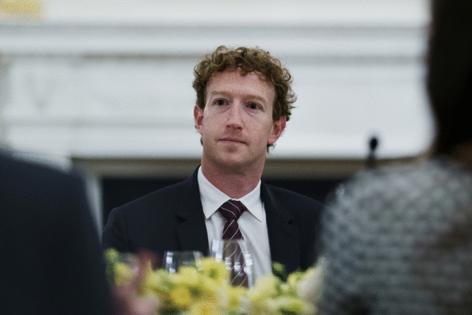Parmy Olson: Mark Zuckerberg is picking groupthink over an AI godfather
Published in Op Eds
When you're a leading scientist who thinks Big Tech is chasing the wrong AI breakthrough, you probably won’t last long at a company desperate to catch up with the herd. Yann LeCun, a French-U.S. scientist known as one of the Godfathers of AI thanks to his foundational research on deep learning, is leaving Meta after 12 years to start his own company, according to the Financial Times. His departure underscores just how much Mark Zuckerberg has pivoted away from seeking the next innovative shift in AI to chasing its latest trend: scrambling to match OpenAI by cloning ChatGPT.
LeCun has long been an outspoken, contrarian thinker on AI, arguing that OpenAI’s sparking of the generative AI boom also created an unhealthy obsession with large language models (LLMs). LeCun’s view is that chatbots might be alluring and useful, but they aren’t the path to software that’s smarter than humans. For that you need “world models,” which are trained on videos and other spatial data from the physical world, picked up with sensors and cameras, not just content scraped from the internet.
He’s not alone in thinking that. Fei Fei Li, a former Stanford University professor sometimes called the Godmother of AI, also argues that the next frontier of AI is “spatial intelligence.” LLMs “remain wordsmiths in the dark; eloquent but inexperienced,” she says, pointing to their issues with errors.
But a big breakthrough with world models is probably years away, and language models are making money today. The writing has been on the wall for LeCun since June, when Zuckerberg invested $14.3 billion in data-labeling startup Scale AI and appointed its chief executive officer, Alexandr Wang, to lead a new unit at Meta called Superintelligence Labs. Zuckerberg went on a hiring spree of rockstar AI researchers, offering pay packages as high as $200 million and the tantalizing possibility of being on the team that builds ultra-smart computers before anyone else.
As part of that restructuring, LeCun went from overseeing Meta’s AI strategy to reporting to the 28-year-old Wang instead of Meta’s Chief Product Officer Chris Cox. That alone would have grated for the veteran researcher, but a bigger shift was happening in how Meta invested in AI: away from fundamental research and toward products. In October, Meta laid off 600 researchers from LeCun’s unit while several other high-profile researchers left, including Soumith Chintala, the creator of a popular open-source platform called PyTorch.
Meta spent years building its street cred among frontier AI researchers with projects like PyTorch and Llama, the first open-source AI platform to gain mainstream success. Building a research-driven culture helped attract talented engineers, as did the possibility of working with big names like LeCun. Zuckerberg had approached him in 2013 with a blank check to build the world’s best AI research lab, what would become known as Facebook Artificial Intelligence Research, or FAIR.
It was a coup at the time. LeCun had become an AI legend for inventing convolutional neural networks while working at AT&T Bell Laboratories. The breakthrough technology taught computers to recognize images, powering everything from facial recognition to self-driving cars. Zuckerberg showed up in person at a conference to recruit him.
Twelve years later and LeCun has been sidelined by Zuckerberg’s new obsession with LLMs, which should come as no surprise given the Meta boss’ years-long strategy of copying other platforms such as Snapchat and TikTok to stay relevant. Wang now oversees development of Meta’s language models, and the company’s October layoffs hit FAIR while sparing Wang’s team. That underscores Zuckerberg’s bet on his expensive new hires over the legacy staff working under LeCun and pushing forward his research on world models.
Meta, which booked net income of about $62 billion last year, and has $44.5 billion in cash on its balance sheet, was one of the few companies that could afford to take the long view on artificial intelligence and hold out for a breakthrough. But its shift to LLMs shows just how much groupthink has captured the industry. That could end up a huge waste if today’s generative AI developers don’t figure out how to improve their models more significantly, or stop them from making mistakes. Losing LeCun won’t hurt Meta’s quarterly earnings, but it does mean it won’t invent whatever comes next after LLMs.
©2025 Bloomberg L.P. Visit bloomberg.com/opinion. Distributed by Tribune Content Agency, LLC.
























































Comments